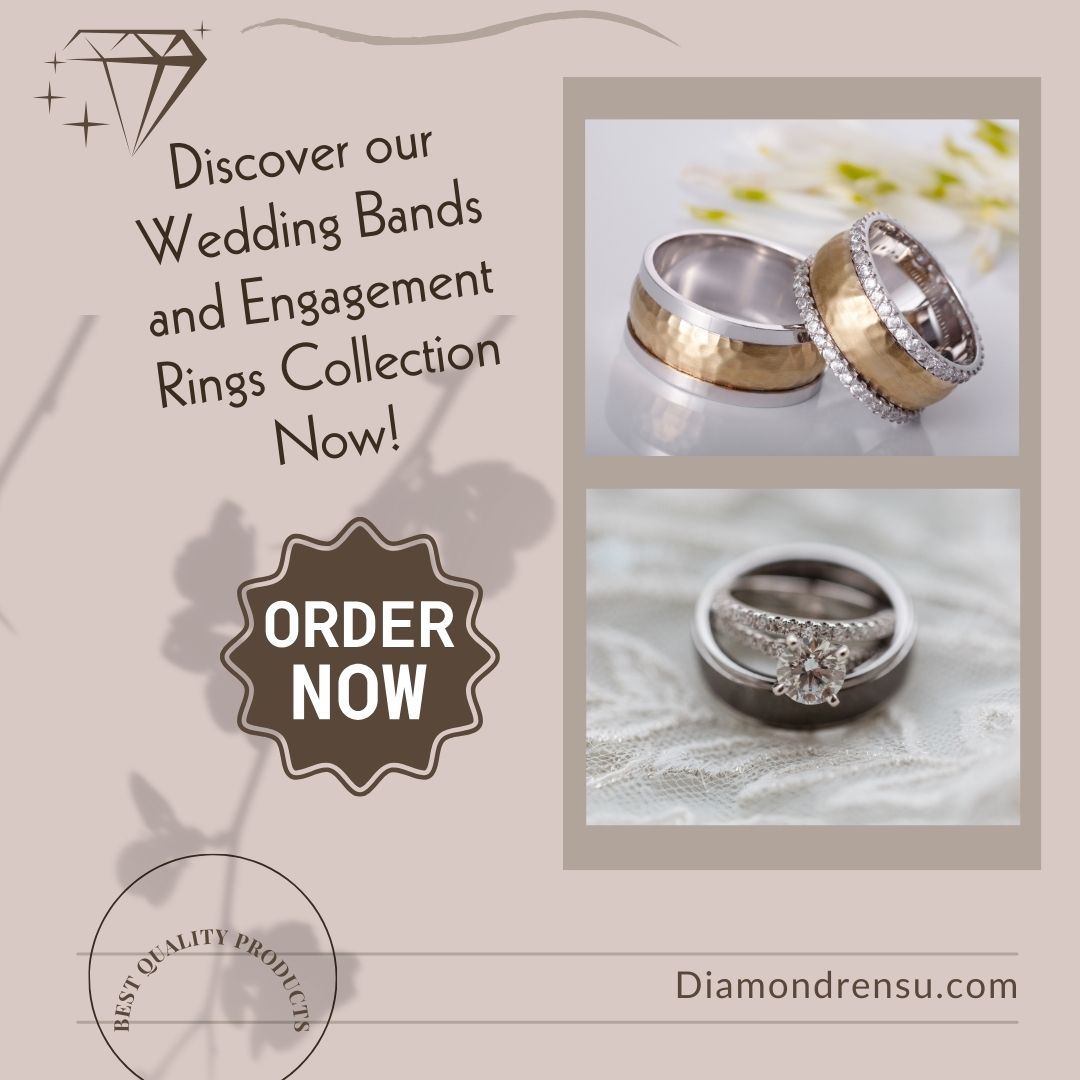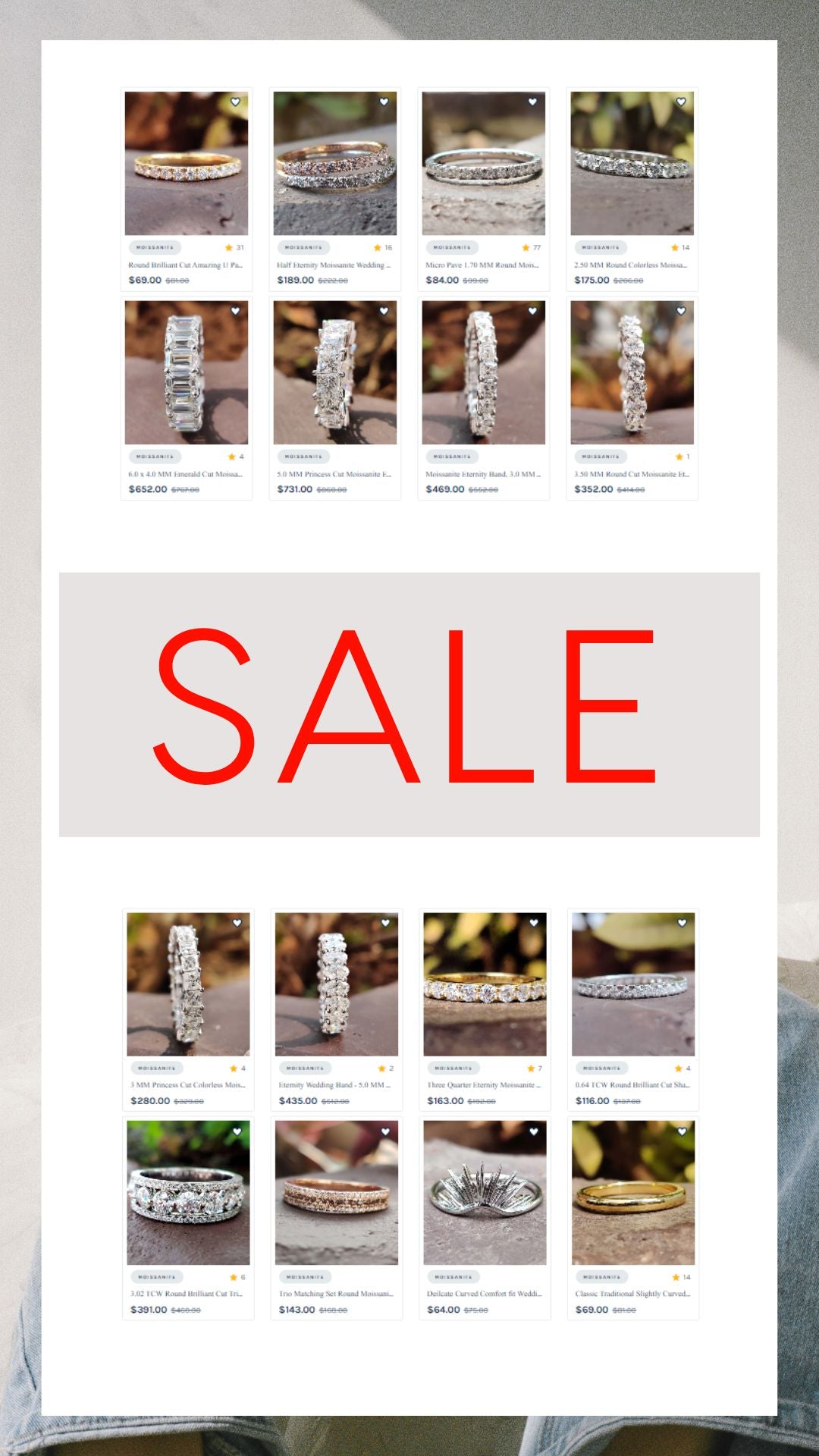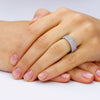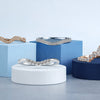
Best Metal for Wedding Band: Durability Meets Elegance
When selecting the metal for your wedding or engagement ring, it's crucial to consider both style and function. Gold has traditionally been the go-to choice, offering a range of hues such as classic yellow, elegant white, and romantic rose, each lending a different aesthetic to your band. However, modern alternatives like titanium have become popular for their strength and affordability, providing a contemporary look and a lightweight feel that's comfortable for daily wear.
Table Of Contents
- Evaluating Durability and Hardness
- Understanding Metal Allergies and Skin Sensitivity
- Assessing Metal Colors and Aesthetics
- Choosing a Wedding Band Material
- Comparing Traditional and Alternative Metals
- Considering Lifestyle and Daily Wear
- Metal Quality and Value Considerations
- Ring Maintenance and Care
- Sizing and Resizing Considerations
- Cultural and Historical Significance
- Identifying Reputable Jewelers and Retailers
- Environmental Impact and Sustainability
- Innovative Technologies in Ring Making
- Customer Service and Warranty Support
- Input from Experts and Industry Professionals
- Final Thoughts on Metal Selection
- Frequently Asked Questions
Apart from aesthetics, the longevity and wearability of the metal are paramount. Metals like platinum and palladium are prized for their durability and hypoallergenic properties, making them suitable for anyone to wear, even those with sensitive skin. For those looking for a balance between durability and cost, metals like stainless steel and silver, particularly in the form of sterling silver which is stronger due to its alloy composition, offer viable options.
Understanding the unique qualities of each metal—from the scratch resistance of titanium to the classic warmth of gold—will help you make an informed choice that fits your lifestyle and preferences. Whether you prioritize longevity, hypoallergenic properties, or affordability, there's a metal out there that is the right fit for your wedding band or engagement ring.
Evaluating Durability and Hardness
When choosing the best metal for your wedding band, you need to consider both durability and hardness. Durability refers to a metal's resistance to wear and tear, while hardness determines how well it can resist scratches.
- Tungsten is renowned for its impressive hardness and scratch resistance, making it a top choice if longevity and low maintenance are your priorities. However, tungsten can be brittle in certain scenarios and may crack under extreme pressure.
- Titanium is another strong contender, known for its strength and lighter weight. It offers considerable durability and is also hypoallergenic, a significant advantage if you have sensitive skin.
- Platinum stands out for its density and durability, sustaining its appearance with minimal scratching over time. It requires less maintenance than gold, but it is heavier and often more expensive.
Table: Metal Comparison in Terms of Hardness and Durability
|
Metal |
Hardness |
Durability |
|
Tungsten |
Most scratch-resistant |
Brittle, can crack under high force |
|
Titanium |
Highly scratch-resistant |
Durable, lightweight, hypoallergenic |
|
Platinum |
Good scratch resistance |
Very durable, denser, maintains luster |
Tungsten carbide, a variant of pure tungsten, is created by combining tungsten with carbon, boosting its scratch resistance and overall toughness. It is a popular alternative due to its balance of hardness and durability.
When selecting the metal, it's crucial to consider your lifestyle and how much wear your ring will endure. The more resilient the metal to scratching and wear, the better it will preserve its original appearance over time.
Understanding Metal Allergies and Skin Sensitivity
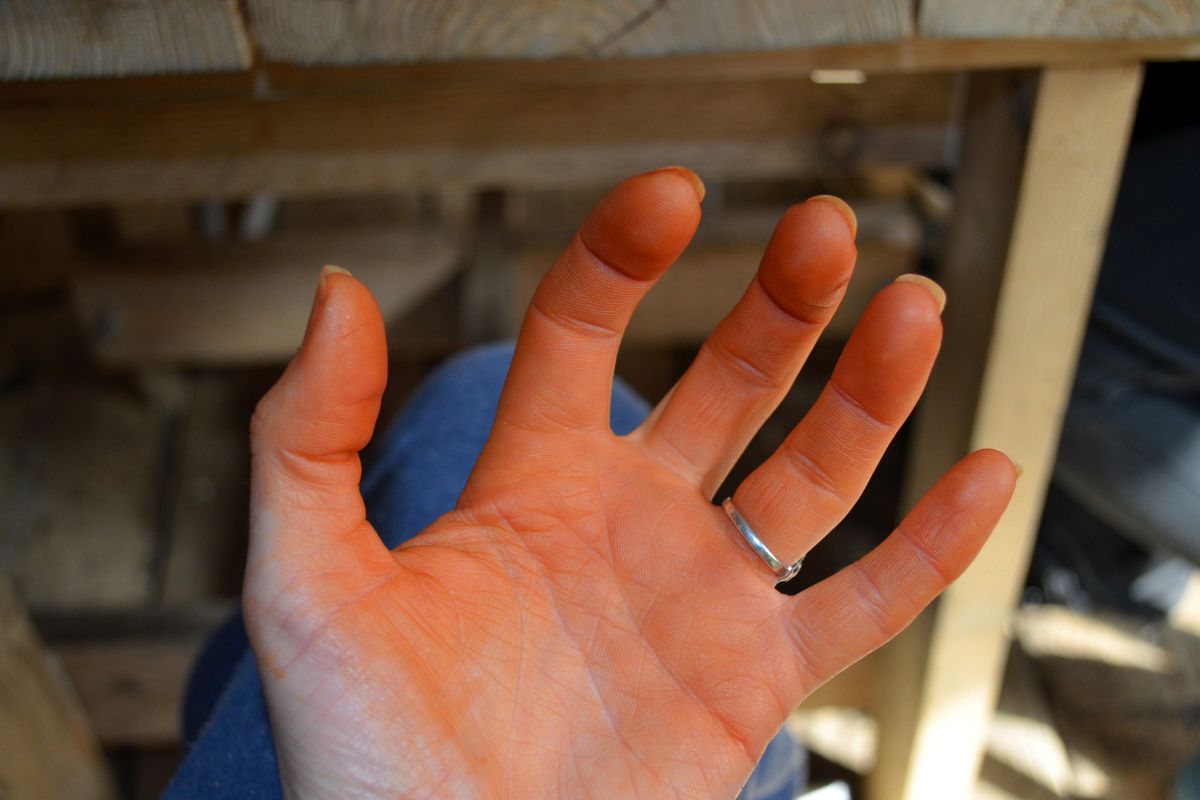
| Metal Type | Allergic Reaction | Skin Sensitivity | Preventive Measures |
|---|---|---|---|
| Gold | Rare | Low | Choose higher karat gold (18k or 24k) or gold-plated jewelry |
| Silver | Occasional | Moderate | Opt for sterling silver or hypoallergenic silver alloys |
| Nickel | Common | High | Avoid nickel-containing jewelry; opt for nickel-free options |
| Platinum | Rare | Low | Choose platinum jewelry for hypoallergenic properties |
When you're choosing a wedding band, understanding potential metal allergies and skin sensitivities is crucial. Allergies occur when your immune system reacts to certain metals, leading to discomfort and skin irritation. To make an informed decision, consider the following points:
-
Hypoallergenic Metals: Hypoallergenic metals are less likely to cause allergic reactions. For wedding bands, consider choosing titanium, platinum, or palladium. These metals are known for their low allergenic properties and are safe for sensitive skin.
-
Common Irritants: Nickel is often associated with skin allergies. It's frequently used in metal alloys but can cause adverse reactions such as itching, redness, or rashes. Verify with your jeweler if your chosen band is nickel-free.
-
Cobalt: Although less common, cobalt can also trigger skin reactions. It's advisable to ask if cobalt is present in the alloy when selecting your ring.
-
Safe Practices: Always discuss your skin sensitivity with a professional jeweler. They can guide you to metals that are well-tolerated by sensitive skin and ensure that your wedding band is comfortable for everyday wear.
Metals Suited for Sensitive Skin:
- Titanium: Strong and lightweight, ideal for active lifestyles.
- Platinum: Durable with a natural white luster; it’s pure and typically alloy-free.
- Palladium: A member of the platinum group of metals, offering similar benefits.
By paying attention to these details, you can ensure your wedding band is a joy to wear without the worry of allergic reactions.
Assessing Metal Colors and Aesthetics
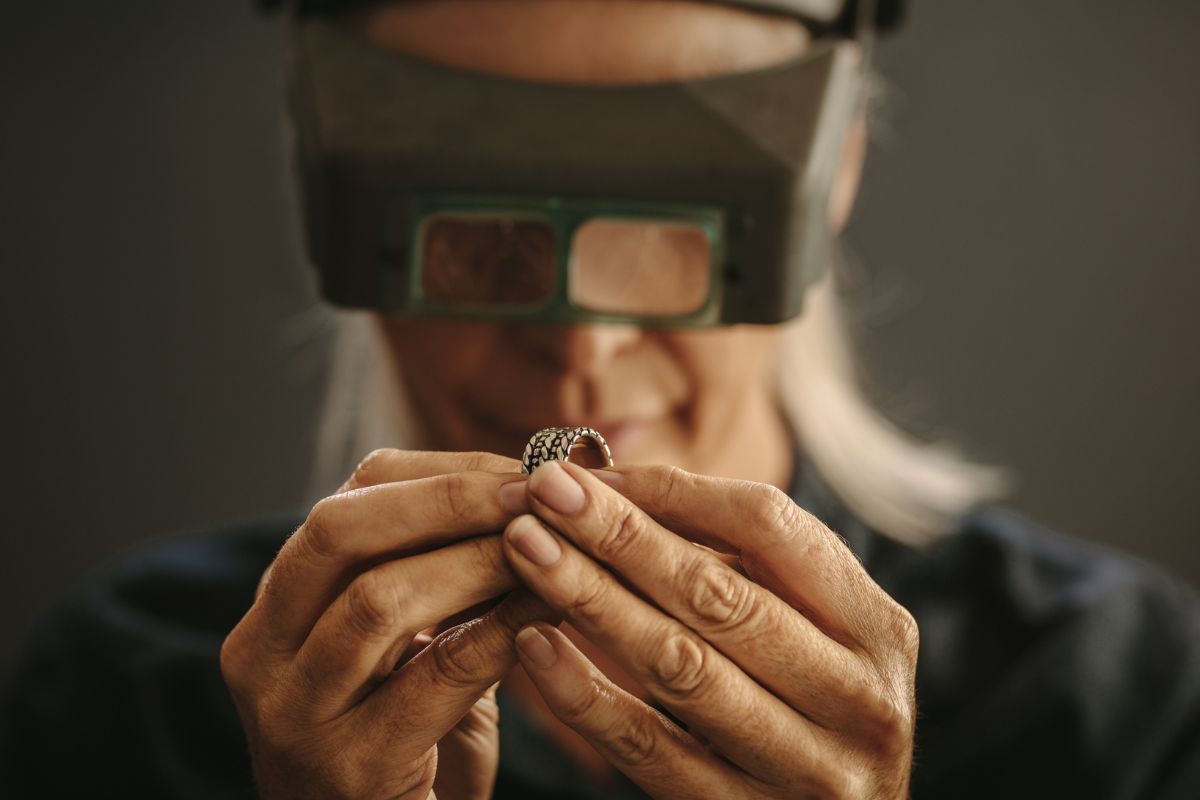
When selecting a wedding band, the color and finish can be just as important as the metal's durability. Your choice should complement your personal style and everyday comfort.
Color Considerations
The inherent color of different metals can influence your wedding band's aesthetic. Yellow gold, available in 14K and 18K purity levels, offers a classic warmth that works well with earthy and darker skin tones, while white gold, often combined with metals like nickel and plated with rhodium, provides a cooler hue. Rose gold, with its blend of gold and copper, has a unique, pinkish tint complimenting all skin tones.
- Gold Purity Levels:
- 14K Gold: Less pure but more durable than 18K, it's a balancing act between aesthetics and functionality.
- 18K Gold: A richer, deeper yellow due to higher gold content, but more prone to scratches.
Design and Style Preferences
Your choice in metal can align with a design that suits your personal style, whether it's traditional, minimalist, ornate, or contemporary. Gold alloys such as rose gold offer a distinctive look that may appeal to your taste for uniqueness, while the icy sheen of platinum is often associated with modern, masculine designs. Jewelers can propose designs that amplify the color attributes of each metal.
Common Alloy Compositions
Alloys are a mixture of metals which improve the properties of pure gold:
- Yellow Gold: Typically alloyed with copper and zinc, balancing color with strength.
- White Gold: Combines gold with white metals such as palladium or nickel, and is often coated with rhodium plating for extra shine and scratch resistance.
- Rose Gold: The addition of copper gives it a rosy hue and added durability.
Special Finishes and Coatings
Metals like platinum and white gold can be finished with special coatings to enhance their appearance. Rhodium plating, for instance, is used on white gold to increase its whiteness and resistance to scratches and tarnishing. Over time, plated items may require re-plating to maintain their original luster.
- Rhodium Plating: Adds a protective layer to white gold, enhancing shine and durability.
- Patina on Platinum: Some prefer the natural patina that develops on platinum, which can give the piece a vintage appearance without the risk of tarnishing.
Choosing a Wedding Band Material
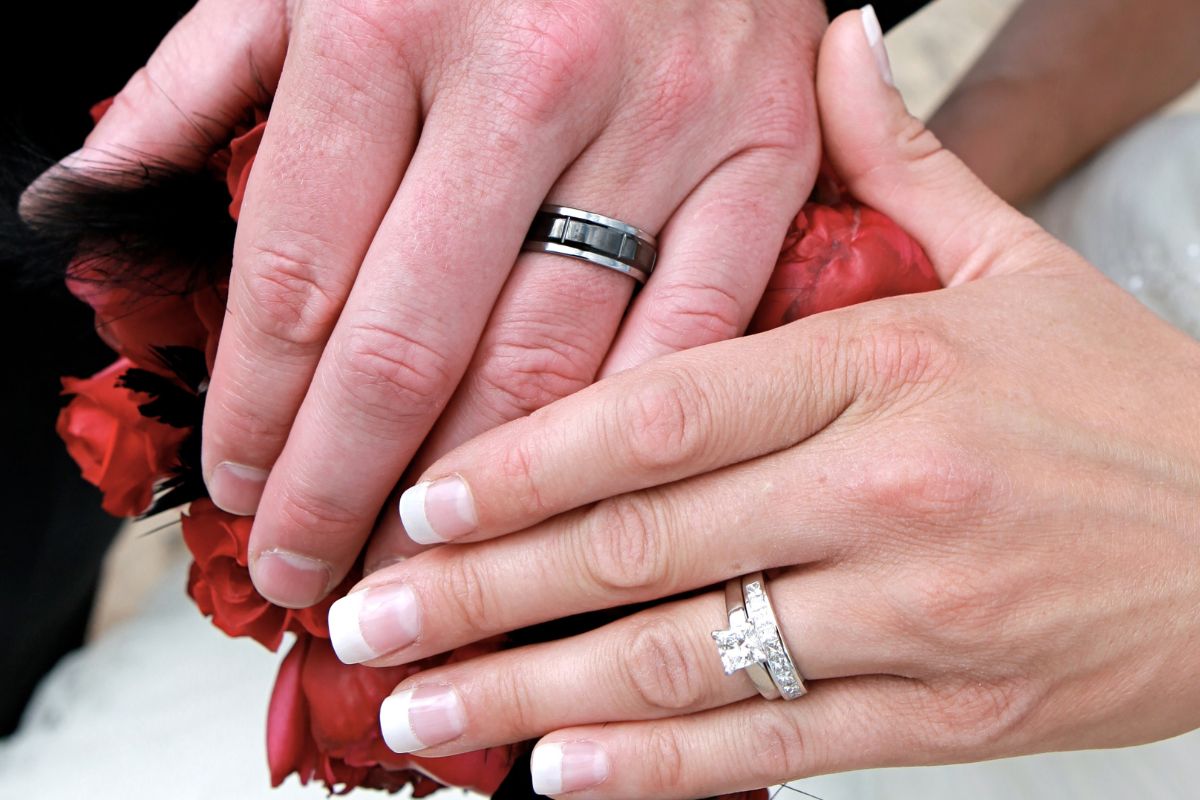
When selecting your wedding band, the material is a crucial consideration. Each metal offers different benefits in terms of aesthetics, durability, and cost, which may influence your decision.
Platinum is a top choice for wedding bands due to its strength and durability. It's hypoallergenic and maintains its white sheen without the need for re-plating. However, it's among the most expensive options.
Gold is the classic choice. Available in yellow, white, and rose variations, it's softer than platinum, which means it can scratch more easily. The karat rating will indicate its purity, affecting both price and strength.
|
Metal |
Characteristics |
Considerations |
|
Platinum |
Durable, hypoallergenic |
High cost, heavy |
|
Gold |
Traditional, various colors |
Prone to scratches, variable purity |
|
Silver |
Lustrous shine, affordable |
Soft, tarnishes over time |
|
Cobalt |
Hard, scratch-resistant |
Less traditional, can be brittle |
|
Stainless Steel |
Strong, resistant |
Less precious, industrial look |
|
Ceramic |
Scratch-resistant, light |
Brittle, hard to resize |
|
Tantalum |
Rare, blue-gray tone |
Difficult to find, pricey |
|
Meteorite |
Unique pattern, rare |
Can rust, requires care |
Silver, while more affordable and with a bright shine, tends to tarnish and is softer, which means it's not as durable as other metals.
Cobalt boasts a high level of hardness and scratch resistance, while stainless steel is known for its strength and durability, with a more industrial appearance.
Ceramic is valued for being scratch-resistant and lightweight but can be brittle.
Exotic materials like tantalum and meteorite are unique choices with distinct appearances. Tantalum is rare with a blue-gray hue, while meteorite bands have irreplaceable patterns. Be mindful that meteorite requires maintenance to prevent rust.
Choosing the right metal for your wedding band is a personal decision. Balance your priorities regarding the ring's appearance, maintenance needs, and your budget to select the best metal to symbolize your union.
Comparing Traditional and Alternative Metals
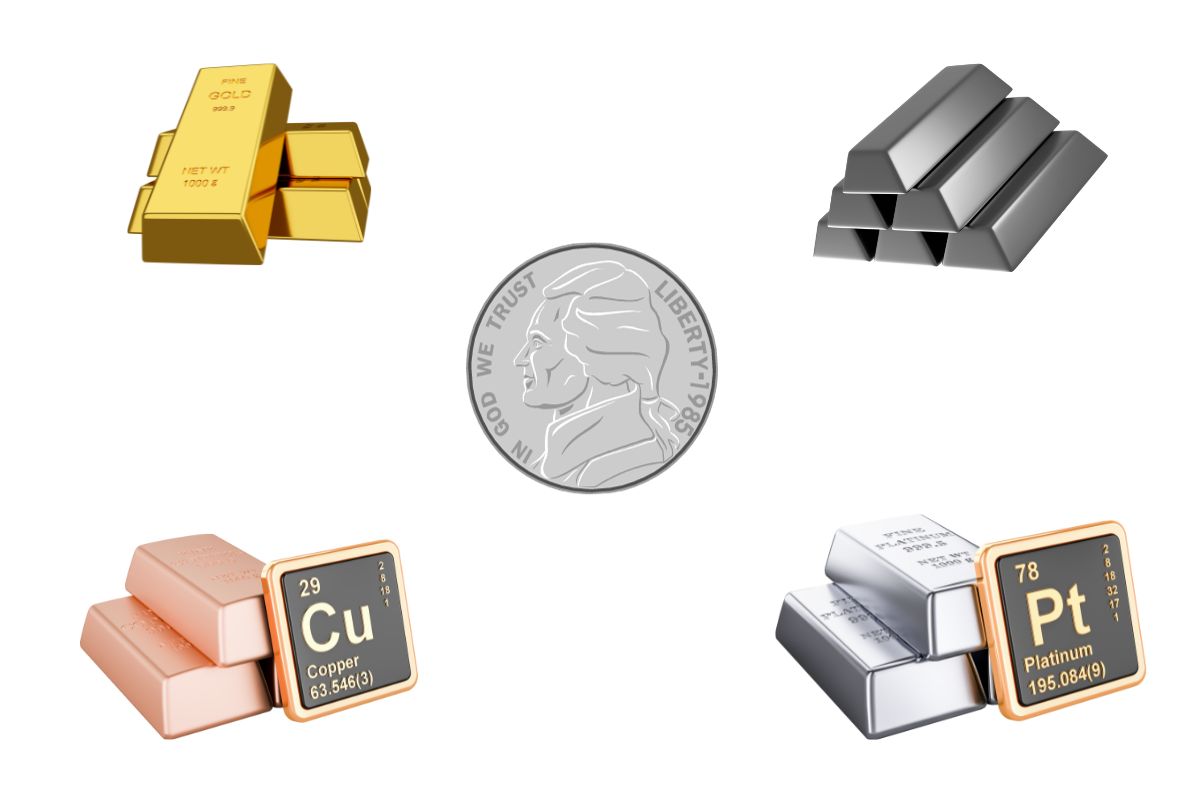
When selecting your wedding ring metal, understanding the differences between traditional precious metals and modern alternative materials is key. Each category offers its own set of benefits tailored to varying lifestyles and preferences.
Pros and Cons of Precious Metals
Gold: Highly valued for its classic appeal and luxurious status, gold is a traditional favorite.
- Pros:
- Luxury Appeal: Conveys a sense of timeless value and luxury.
- Variety: Available in yellow, white, and rose hues to match personal style.
- Cons:
- Expense: Can be more costly than alternative metals.
- Durability: Softer and more prone to scratching, requiring regular maintenance.
Platinum: Recognized for its superior durability and natural white sheen.
- Pros:
- Durable: Resistant to wear, making it a long-lasting choice.
- Purity: Often used in almost pure form, ideal for those with sensitive skin.
- Cons:
- Expense: Generally more expensive than gold.
- Weight: Heavier feel, which some might find less comfortable.
Silver: A softer metal with a timeless, understated elegance.
- Pros:
- Affordability: More budget-friendly than gold or platinum.
- Craftsmanship: Allows for intricate designs due to its malleability.
- Cons:
- Tarnishing: Requires regular polishing to maintain its luster.
- Softness: More susceptible to scratches and deformation over time.
Benefits of Alternative Metals
Tungsten: Boasting an impressive scratch resistance, tungsten is a solid choice for durability.
- Pros:
- Scratch Resistance: Among the most scratch-resistant materials for wedding bands.
- Affordability: Offers a budget-conscious yet high-quality option.
- Cons:
- Brittleness: Can crack under high pressure or impact.
- Customization: Difficult to resize due to its hardness.
Titanium: Known for its strength and hypoallergenic properties.
- Pros:
- Lightweight: Strong yet lightweight, comfortable for everyday wear.
- Biocompatibility: Safe for all skin types, reducing the risk of allergic reactions.
- Cons:
- Lesser Shine: Doesn't have the same luster as some precious metals.
- Resizing: Challenging to resize, which might be a concern as finger sizes change.
Alternative materials also include ceramic, tantalum, cobalt, and even meteorite. These materials often cater to those seeking unique and less conventional ring styles while maintaining durability at an often more affordable price point. While they may not carry the same traditional value as gold, platinum, or silver, they offer fresh, personalized choices that can reflect individual tastes and lifestyles.
Considering Lifestyle and Daily Wear
When selecting a wedding band, it's essential to consider your lifestyle and the daily wear the ring will endure. Your daily activities can significantly influence the choice of ring metal, since some metals can withstand more wear and tear than others.
Durability
Metals vary in hardness and durability:
- Platinum: Very durable; doesn't scratch easily. Best for active lifestyles.
- Gold: Softer metal; prone to scratches. Requires more maintenance.
- Titanium: Extremely durable and scratch-resistant.
Maintenance
How often you're willing to maintain your ring is also crucial:
- Platinum: Develops a patina over time; may require polishing to maintain shine.
- Gold: Higher karat gold (22K, 24K) can dent; lower karat (14K, 18K) is more durable but may need regular cleaning.
- Titanium: Low maintenance; retains appearance without much care.
Activities and Exposure
Consider what substances your ring will be exposed to:
- Chemicals: Harsh chemicals can damage some metals. Platinum and titanium are resistant.
- Physical Work: If your work involves physical labor, consider a harder metal to avoid dents and deformation.
Consult with a professional jeweler to find a wedding band that matches your personal lifestyle. They can offer valuable guidance on which metals are best suited for your day-to-day wear and provide tips on maintenance to ensure the longevity of your ring.
Metal Quality and Value Considerations

When selecting a wedding band, understanding the quality and long-term value of the metal is crucial for making an informed decision that aligns with both your aesthetic preferences and financial considerations.
Understanding Karat and Gold Purity
Gold purity is measured in karats, with the term "karat" representing the proportion of gold in the alloy. 24k gold is pure gold and therefore the softest, making it less suitable for wedding bands that withstand daily wear. For a balance between purity and durability, 18K gold (75% gold) and 14K gold (58.3% gold) are popular choices, given they are mixed with other metals like copper and zinc to enhance strength.
- 24K Gold: 99.9% pure gold
- 18K Gold: 75% gold, 25% other metals
- 14K Gold: 58.3% gold, 41.7% other metals
Value Over Time and Resale Value
The value of your wedding band over time can be influenced by the chosen metal. Precious metals like gold and platinum are considered good investments due to their enduring value. Resale values for gold jewelry are often tied to the current market price for gold, affecting both luxury and more affordable options. While silver and other less costly metals may not have the same resale value as gold, they can still be excellent choices depending on your budget and desire for a particular look or style.
- Gold: High resale value, often linked to market price
- Platinum: More expensive initially, maintains a high resale value
- Silver: More affordable, lower resale value
By considering both the karat and the long-term value retention of the metal, you can select a wedding band that not only looks beautiful but also serves as a wise financial choice.
Ring Maintenance and Care
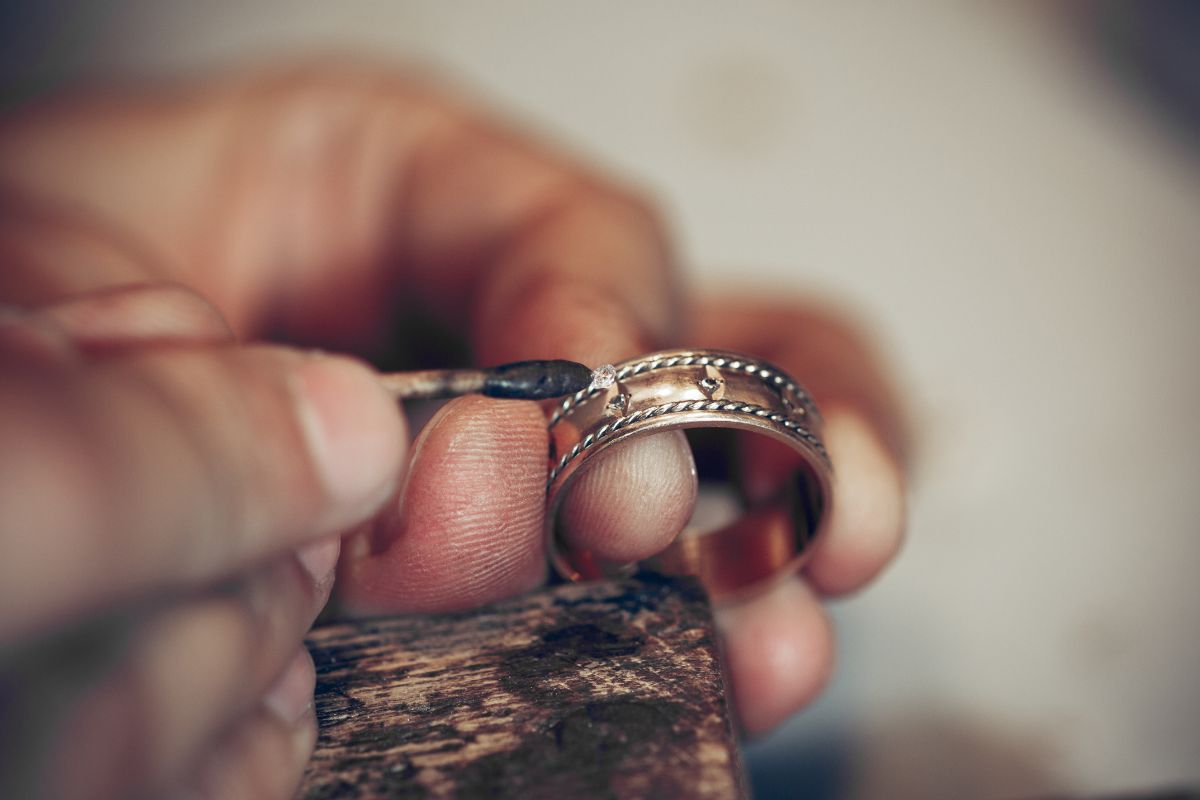
To ensure that your wedding band retains its sheen and durability, regular maintenance is a must. The manner in which you care for your ring can vary based on the metal it is made from. Here's a succinct guide on what you should do:
-
Cleaning: Gently clean your ring using a solution of warm water and dish soap. Soak for 20-30 minutes, then use a soft brush to remove buildup. Dry with a lint-free cloth.
-
Scratch Resistance: Metals like platinum and titanium boast high scratch resistance. However, even scratch-resistant rings should be stored separately to avoid contact with harder materials.
-
Daily Wear and Activities: It's wise to remove your ring during heavy physical activities, which can expose it to harsh chemicals or undue pressure, potentially causing damage.
-
Professional Maintenance: Once or twice a year, visit a professional jeweler for thorough cleaning and inspection for any wear or scratches that might need attention.
By adhering to a consistent maintenance routine, you can protect your wedding band from common issues and prolong its pristine condition. Note that some metals, like gold, might need more frequent checks due to their softer nature.
Remember to assess the daily risks to your ring based on your lifestyle and to act accordingly, ensuring that your precious symbol of love and commitment remains in its best state throughout your married life.
Sizing and Resizing Considerations

When selecting a wedding band, consider the metal's ability to be resized. Gold, known for its malleability, allows jewelers to easily resize the ring by removing or adding material to adjust the fit. This could be necessary due to sizing issues over time caused by weight changes or inaccuracies in initial measurements.
Platinum shares similar resizing advantages with gold, despite being denser. It can be heated and manipulated by a jeweler, albeit with more difficulty due to its strength. The resizing process for platinum can be more labor-intensive, hence potentially more costly.
Other metals like tungsten and ceramic are extremely hard and cannot be resized. If your wedding band is made from tungsten or ceramic, you'll likely need to replace the ring in the event of sizing changes. Titanium falls somewhat in between; it's possible to resize, but the process is complicated and not all jewelers offer this service.
Resizing Limits
- Gold: Extensive resizing possible
- Platinum: Limited, more complex resizing
- Tungsten & Ceramic: No resizing; replacement required
- Titanium: Limited resizing options
Tips for Sizing
- Always get professionally measured by a jeweler.
- Consider seasonal changes; fingers can swell in heat and contract in cold.
- Account for width of band; wider bands fit tighter and may require a larger size.
- Remember that detailed or engraved rings may alter post-resizing appearance.
Choosing a resizable metal like gold or platinum provides flexibility for future adjustments. However, if you prefer metals that can't be resized, ensure you have an accurate size from the outset to avoid complications later on.
Cultural and Historical Significance
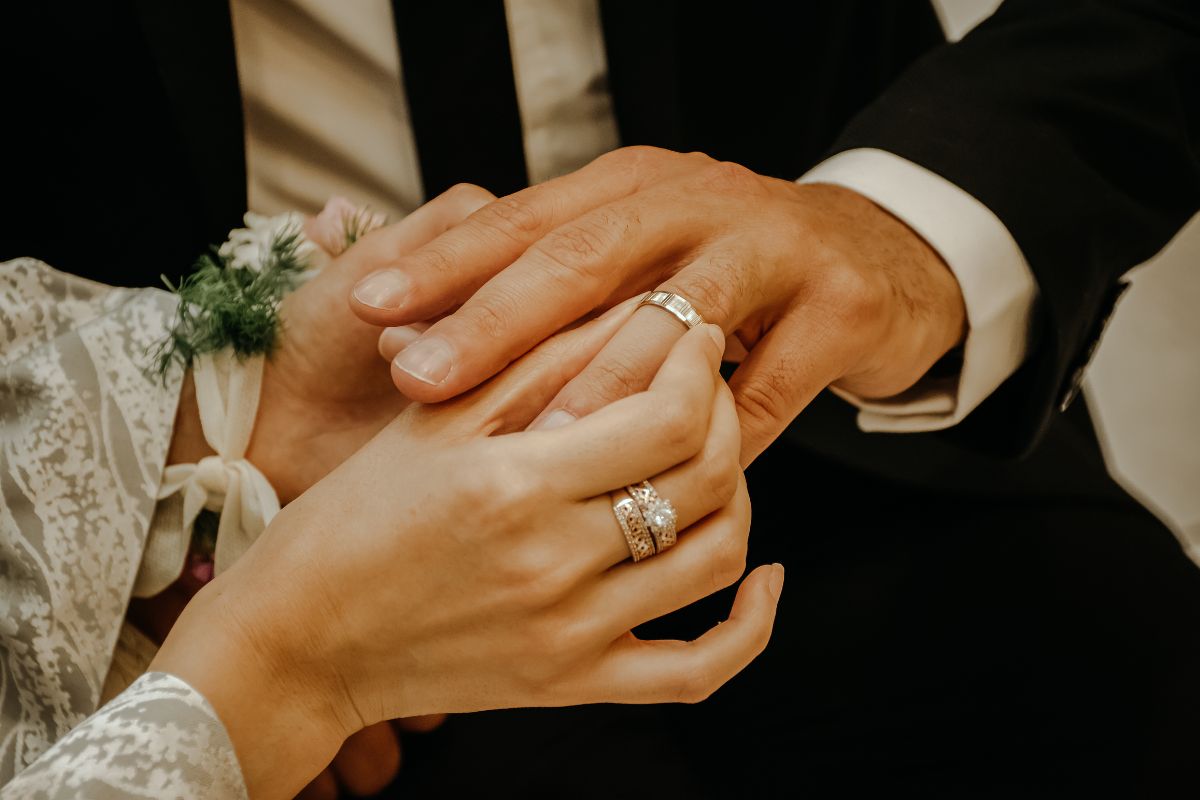
Throughout history, the cultural and historical context of wedding bands has deeply influenced their significance and the choice of metal. In ancient Greece, for example, rings were often made from iron, representing strength and permanence in marriage. Over time, precious metals like gold became popular, symbolizing not just an unending bond but also wealth and status.
Moving to Rome, you would find the ritual of giving a ring as a public pledge to honor a marriage contract. The Romans also believed in the 'Vena Amoris,' a vein said to run directly from the fourth finger to the heart. This belief is why even today, many cultures place the wedding band on the ring finger of the left hand.
Cultural traditions have a strong influence on the choice of wedding band metals within different societies. Some cultures hold silver in high esteem, while others prefer gold or platinum. These choices often reflect historical availability and local customs.
Here is a brief overview of traditional metals and their cultural significance:
- Iron (Ancient Greece): Strength and permanence
- Gold (Widespread across cultures): Wealth, purity, and the standard for many wedding bands
- Silver (Certain cultures): Beauty and balance
- Platinum (Modern trend): Durability and exclusivity
Your choice of metal may not only reflect your personal taste but also honor historical and cultural traditions. Each metal carries its legacy, from the iron of ancient Greece to the modern preference for platinum's durability. When choosing your wedding band, you're participating in a historical tradition that dates back thousands of years and crosses countless cultural boundaries.
Identifying Reputable Jewelers and Retailers
When looking for a jeweler or retailer to purchase your wedding band, there are several key factors to consider to ensure you're choosing a trusted source:
- Certifications: Ensure the jeweler is certified by recognized institutions, such as the Gemological Institute of America (GIA) or the American Gem Society (AGS).
- Reputation: Read customer reviews and testimonials. Look for businesses that have a long-standing reputation for quality and service.
- Policies: Check the retailer’s return, warranty, and service policies. A reputable retailer will often provide generous and clear policies for their customers.
Expert Tips
- Ask for referrals: Word of mouth is powerful. Ask friends or family for recommendations.
- Seek Expertise: Look for jewelers who are knowledgeable about different metals and their properties.
- In-Person Inspection: If possible, visit the store to inspect the quality of their products yourself.
Where to Start
- Begin with known retailers or jewelers with industry recognition.
- Use the Better Business Bureau (BBB) to check the business ratings.
- Attend local bridal expos or fairs where you can meet jewelers and see their work firsthand.
By carefully considering these points, you position yourself to find a jeweler or retailer that provides both quality merchandise and a satisfying shopping experience.
Environmental Impact and Sustainability
When you're choosing the metal for your wedding band, considering the environmental impact is crucial. Precious metals mining can be intensive, leading to significant ecological damage, including soil erosion, deforestation, and pollution. However, sustainable and eco-friendly options are available.
Recycled Metals:
Opting for recycled gold or platinum reduces the demand for newly mined materials. It's worth noting that:
- Gold: Recycled gold reuses existing metal, which means there is no new mining impact.
- Platinum: Similarly, recycled platinum minimizes the environmental footprint.
Lab-Grown Diamonds: These are an alternative to mined diamonds:
- Pros: They have minimal environmental impact.
- Cons: Energy-intensive production.
Sustainable Brands: Choose brands that prioritize green choices, such as:
- Brilliant Earth: Utilizes recycled materials and lab-grown diamonds.
- Mejuri: Offers rings made of 95% recycled materials.
Eco-Friendly Practices: Some jewelers use fairmined gold, which assures ethical extraction processes that do not exploit the environment or workers.
Certifications: Look for certifications like the Beyond Conflict Free™ which indicates adherence to stringent ethical and environmental standards.
By considering these factors, you can make an eco-friendly choice that aligns with your values and lowers your carbon footprint. Remember, your decision can contribute to a greener, more sustainable future.
Innovative Technologies in Ring Making
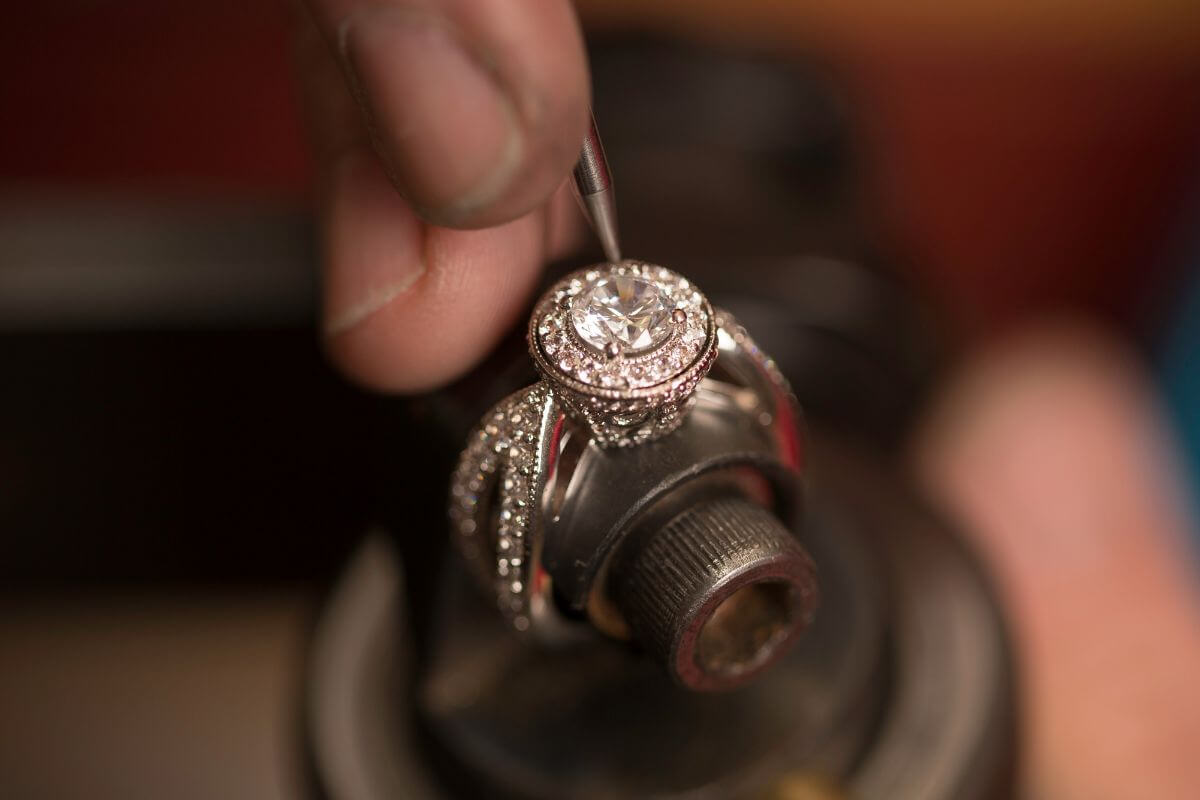
When choosing a wedding band, you now have more options than ever, thanks to advancements in technology and innovation. Modern ring-making embraces both cutting-edge techniques and materials, ensuring that your selection is as unique as your relationship.
Laser Engraving: Today's lasers can etch intricate designs and personal messages on both men's and women's wedding bands. This precision allows for customization that was once impossible with traditional tools.
3D Printing: 3D printing technology has revolutionized ring manufacturing, allowing designers to create complex and unique shapes that are both strong and lightweight.
Materials:
- Titanium: Known for its strength and hypoallergenic properties, making it an excellent choice for anyone, including those with sensitive skin.
- Tungsten: Recognized for its scratch-resistant nature, it's an ideal option for a lifestyle that demands durability.
- Ceramics: Offer a contemporary look with a range of colors and finishes, appealing to both traditional and modern tastes.
CAD Designing: Computer-Aided Design (CAD) allows for the precise engineering of rings. With CAD, you can see a 3D prototype of your wedding band before it's even made, ensuring the final product matches your vision.
|
Technology |
Benefit |
|
Laser Engraving |
Precision and customization |
|
3D Printing |
Complex shapes and lightweight design |
|
CAD |
Accurate prototypes and custom designs |
Remember, whether you are drawn to men’s or women’s wedding bands, innovative technologies offer you the chance to bring your vision to life with unparalleled accuracy and creativity.
Customer Service and Warranty Support
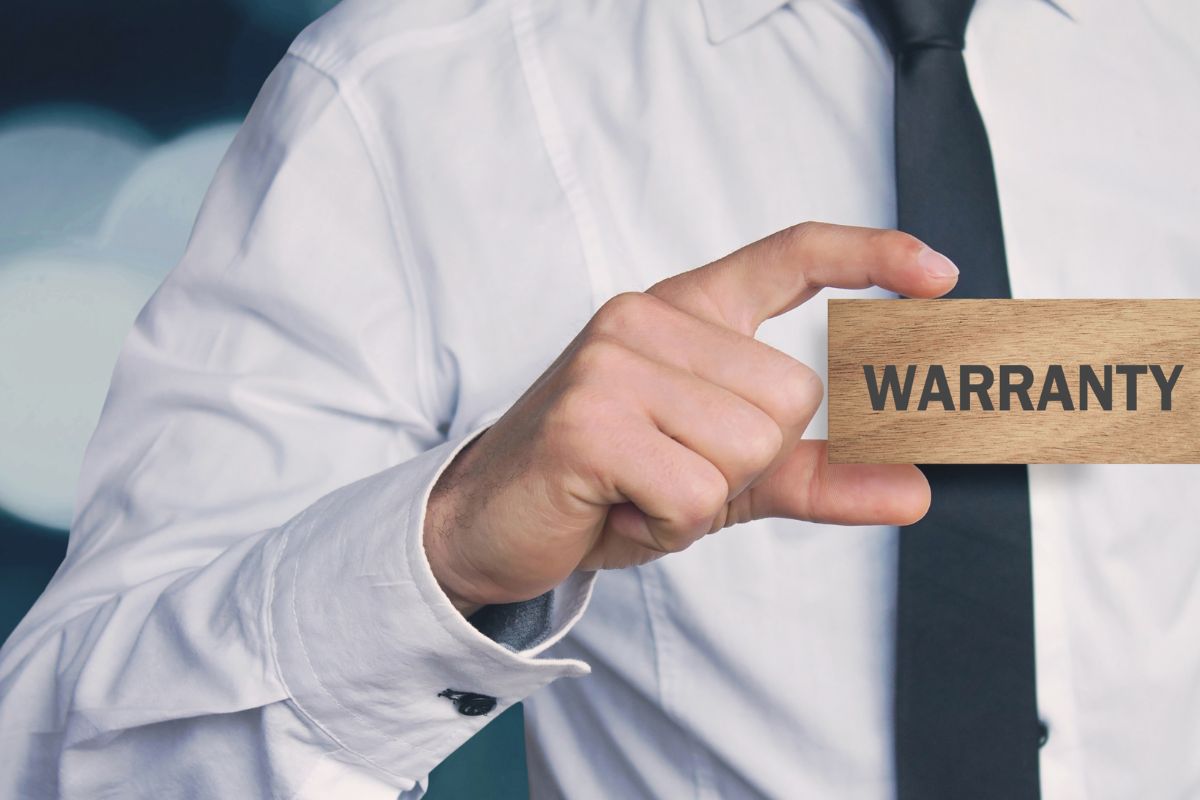
When selecting a wedding band, your buying experience is enhanced by excellent customer service and comprehensive warranty support. Reputable jewelers will offer you attentive customer service that guides you through the selection process, ensuring your satisfaction with the purchase.
Customer Service:
- Pre-Purchase Guidance: Expect knowledgeable staff to help you understand the different metals and their properties.
- Size Adjustments: Look for services that offer resizing to ensure your wedding band fits perfectly over time.
- Engraving Services: Personalization options such as engraving can add unique value to your wedding band.
Warranty:
Ensure that your wedding band comes with a warranty. This is a commitment from the jeweler that your ring will last:
- Durability Guarantee: A warranty should cover potential defects in materials and craftsmanship.
- Maintenance Services: Some warranties include periodic cleaning, inspections, and even repairs.
- Replacement Policies: Understand the terms for replacements in case of loss or extensive damage.
Consumer Rights:
- Return Policy: Familiarize yourself with the return policy, which should allow you to return the wedding band within a specified period if it doesn't meet your expectations.
- Certification: Verify that your wedding band comes with proper certification for authenticity.
By ensuring robust customer service and warranty support, you safeguard your investment and gain peace of mind that any future issues will be handled professionally. Always read the fine print and ask questions to fully understand what support is available to you.
Input from Experts and Industry Professionals
When you're selecting a wedding band, it's important to consider advice from jewelers and industry experts. Titanium, praised for its modern appearance and affordability, comes recommended for those seeking durable yet budget-friendly options. A ring like the titanium band from James Allen exemplifies affordability at approximately $110.
Here's a summary of insights you should consider:
-
Titanium: Highly scratch-resistant, strong, with a contemporary look.
-
Platinum: Valued for durability and purity, often recommended by professionals for its longevity.
-
Palladium: A less dense, yet resilient alternative to platinum.
-
Stainless Steel: Offers high strength, appealing for an everyday wear piece.
-
Ceramic: Known for resisting scratches, an unconventional choice.
-
Sterling Silver: A softer metal that requires more care, yet it is the whitest and possesses a classic charm.
-
Rose Gold: Noted for its romantic hue and increased durability due to its blend of metals like gold, silver, and copper.
Diverse perspectives reinforce that hypoallergenic properties are important, particularly with metals like titanium, a favorite for sensitive skin. Also consider that metals such as silver may need more frequent cleaning due to tarnishing.
Experts agree that the term 'strong' can refer to a metal's resistance to chipping, breaking, or scratching. It's crucial to assess both durability and resistance before making your final selection. Each metal carries unique properties that cater to different preferences and lifestyles, as outlined by industry professionals. Select your wedding band in alignment with these factors for a piece that will endure a lifetime.
Final Thoughts on Metal Selection
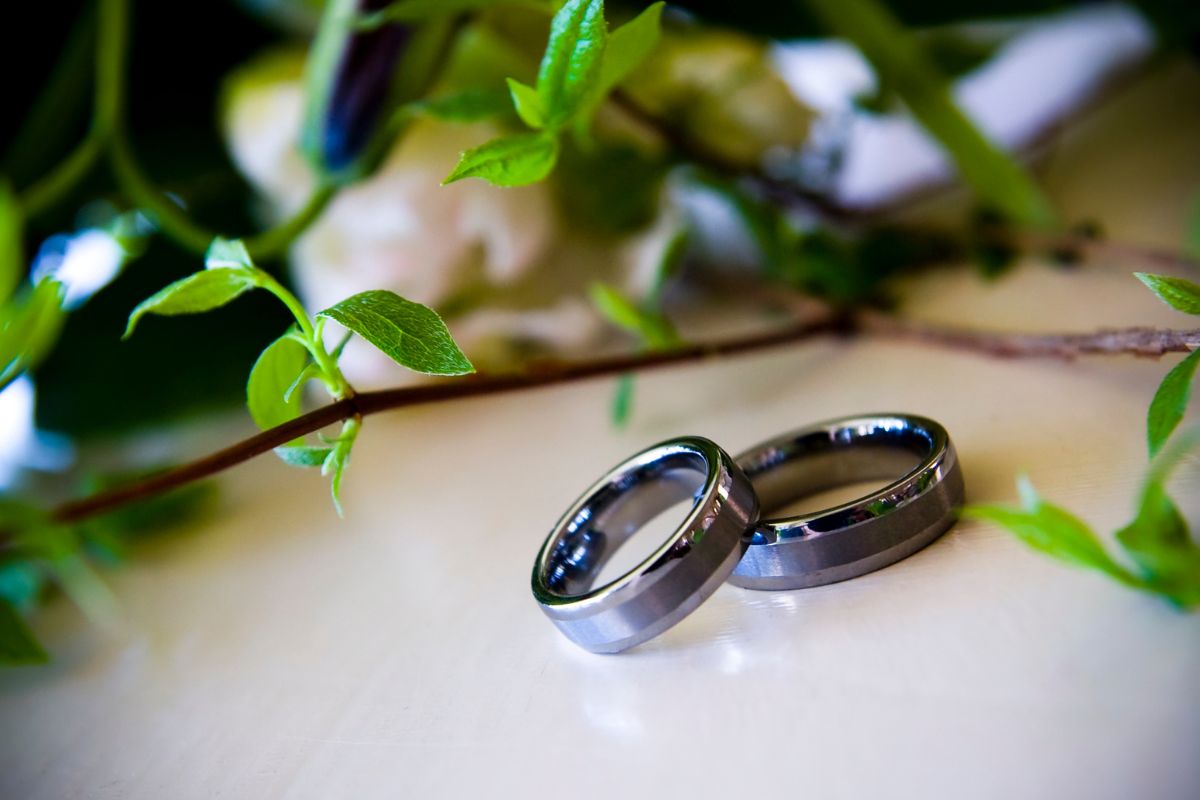
When selecting the metal for your wedding band, acknowledge that it's not just a piece of jewelry; it's a symbol of your lifetime commitment. Your final decision should reflect your personal preferences and lifestyle while considering the long-term wearability and maintenance of the material you choose.
Consider Durability: If your job or hobbies are hands-on, you might lean towards metals known for their strength, like:
- Titanium: Notably scratch resistant and light on the skin.
- Tungsten: Extremely robust with a heavyweight feel.
Assess Hypoallergenic Properties: For sensitive skin, options such as platinum offer a hypoallergenic solution, crucial for comfort over the years.
Reflect on Aesthetics and Maintenance:
- Gold (14K or 18K) captures the classic allure, with a compromise between purity and structural integrity.
- Platinum exudes a modern vibe but remember it comes with a higher price tag.
Budget Considerations: Your budget plays a pivotal role. Gold offers a balance between affordability and quality, while platinum stands at the premium end of the spectrum.
Finally, your wedding band should resonate with you on a personal level. Whether it be the minimalist elegance of titanium or the traditional warmth of gold, choose a metal that you’ll be proud to wear every day.
Frequently Asked Questions
When selecting the right wedding band, you'll want to consider durability, style, and the metal's resistance to daily wear.
Which metal is better for wedding rings?
Gold remains a classic choice for wedding rings, offering a mix of tradition and versatility. With options in yellow, white, and rose, it caters to different tastes. The purity level, marked by karats, affects its appearance and strength, with 14K and 18K being common choices.
What is the toughest metal for wedding bands?
Tungsten is known for its toughness and scratch resistance, making it one of the toughest metals for wedding bands. However, it can be brittle under severe impact.
What is the best metal for a long-lasting ring?
Platinum stands out for longevity due to its density and natural white luster that doesn't fade or tarnish over time, meaning your ring will withstand years of wear.
What material should a wedding band be made of?
The material for a wedding band should ideally be a metal that balances aesthetics with practicality. Gold, platinum, and palladium offer such a balance, combining beauty with resistance to wear and corrosion.
What are the most durable metals for men's wedding bands?
For durability, metals like platinum, tungsten, and titanium are top choices for men's wedding bands. They resist scratching and maintain their finish, making them suitable for professions or lifestyles prone to ring damage.
Which ring materials are best suited for everyday wear?
Metals like gold, platinum, and stainless steel are well-suited for everyday wear. Platinum excels in durability, while gold offers a timeless appeal and stainless steel provides an affordable yet robust option.
Checkout some of our top collections:
Leave a comment
Please note, comments must be approved before they are published.
